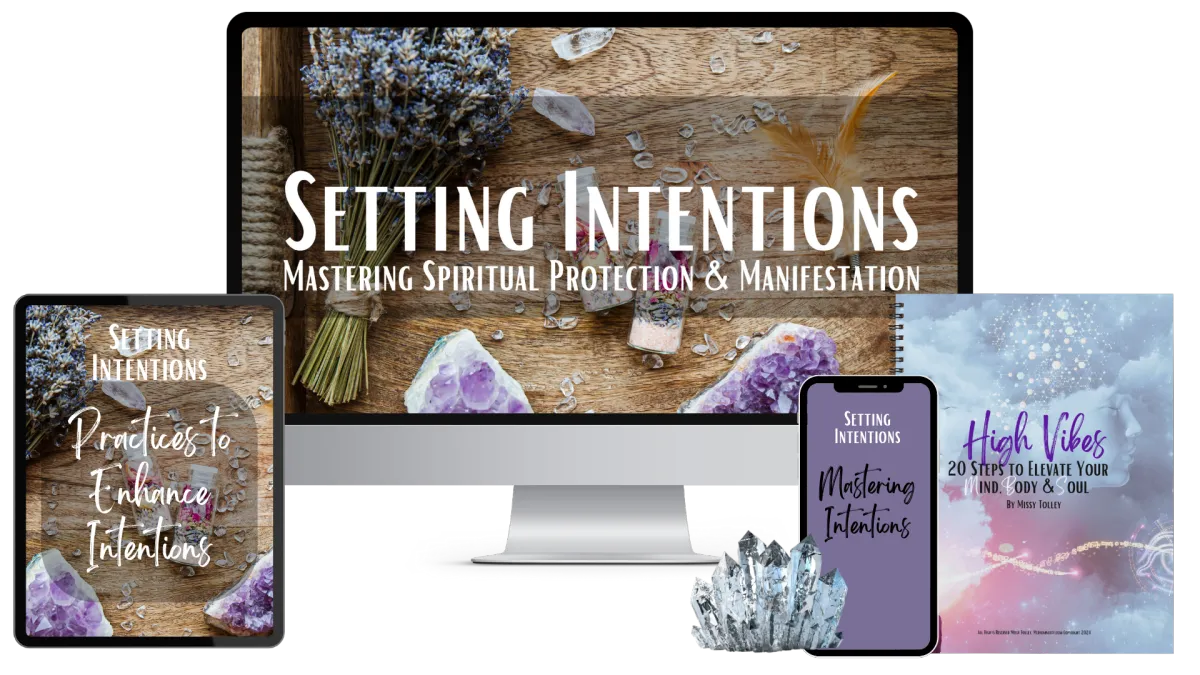



You are made for more.
If you're seeking soul-centered growth, transformation, and a life filled with endless possibilities, you've found your home. This is your space for deep resources, transformational guidance, and the empowerment you need to elevate every aspect of your life.
The number ONE reason you may feel stuck is that you’re ready for MORE. More clarity, more purpose, more alignment. You deserve more.
Consider this your sanctuary for discovering and embracing all that you need to empower your purpose and transform your life. Remember, the best is yet to come. ~Missy Tolley
Elevate Your Life!
As a soul-led spiritual life coach with over 12 years of experience in both personal and professional development, I am deeply committed to helping you empower your purpose and transform your life.
This work is my soul’s calling because I’ve witnessed the profound transformations that occur when someone aligns with their authentic self and steps into their full potential. Life is too precious to remain stuck in fear, doubt, or uncertainty.
I believe you deserve to live with clarity, confidence, and purpose, whether you're navigating personal challenges or striving to elevate your career. Together, we’ll rewrite your narrative, connect you to your higher self, and create a life you love—both inside and out.


You are made for more.
Ready for Soul-Led Transformation?
If you're seeking soul-centered growth, transformation, and a life filled with endless possibilities, you've found your home. This is your space for deep resources, transformational guidance, and the empowerment you need to elevate every aspect of your life.
The number ONE reason you may feel stuck is that you’re ready for MORE. More clarity, more purpose, more alignment. You deserve more.
"Consider this your sanctuary for discovering and embracing all that you need to empower your purpose and transform your life.
Remember, the best is yet to come. "~Missy Tolley
As a soul-led spiritual life coach with over 12 years of experience in both personal and professional development, I am deeply committed to helping you empower your purpose and transform your life.
This work is my soul’s calling because I’ve witnessed the profound transformations that occur when someone aligns with their authentic self and steps into their full potential. Life is too precious to remain stuck in fear, doubt, or uncertainty.
I believe you deserve to live with clarity, confidence, and purpose, whether you're navigating personal challenges or striving to elevate your career. Together, we’ll rewrite your narrative, connect you to your higher self, and create a life you love—both inside and out.

17K+
Happy Clients
12+
Years of Experience
3K+
Successful Students
Helping YOU Empower your Purpose and Transform Your Life!
Do you feel stuck, disconnected, or uncertain about your path?
Imagine a journey that heals your mind, body, and soul, aligns with your deepest desires, and guides you to live a life of clarity, peace, and purpose. This is your time to reconnect, rediscover, and rise into your authentic self.
Deep Healing & Inner Peace
Transformative Spiritual Healing
Empowered Intuition and Inner Guidance
Holistic Success and Balance
Empowered Confidence
Personal & Professional Empowerment

Vibe With Purpose
Courses Available SOON On Demand!
Are you ready for spiritual healing and growth to embrace your full potential?
If you're ready for spiritual healing from past wounds, tap into your intuition, or take your spiritual business to the next level, my exclusive webinars are for you. My webinars are designed to empower you, give you clarity, and provide actionable steps needed to create lasting change. No matter where you are on your journey, I’m here to support you every step of the way.
Spaces are limited, so reserve your spot today and take the first step towards TOTOAL transformation!
Working With Spirit Guides
Connect, clarify and manifest!

$ 22.97
Strengthen intuitive abilities
Overcome fears and doubts
Work with Spirit Guides
Interpret signs and symbols
Learn spiritual protection tips
The Holistic Creator Blueprint
Build Your Brand

$ 44.97
Align goals
Craft a magnetic brand
Marketing strategies
Make your brand stand out
Attract ideal clients
Make more money
The Balanced Body:
Heal, balance, and thrive!

$ 19.97
Release emotional blocks
Heal past wounds
Align mind, body, soul
Reconnect with higher self
Master holistic balance
Lasting transformation
FREE Courses
Explore transformative courses, insightful teachings, and practical strategies designed to elevate your spiritual journey and professional growth.
What YOU Get....for FREE!
Soul-Led Healing & Growth
Intuition/Psychic/Mediumship Development
Spiritual Business Mastery
Personal Development
Empowerment & Confidence

December 20, 2024
Setting Intentions
Are you ready to harness the power of your intentions to protect your energy and manifest your dreams? Unlock the secrets to setting powerful intentions that shield you from negative energies and align you with your highest goals. In this transformative course, you'll learn how to create a protective aura, raise your vibration, and focus your thoughts to attract positivity and abundance. Join "Setting Intentions" and discover practical techniques, engaging exercises, and uplifting insights that will empower you to take control of your spiritual journey.
TESTIMONIALS
from real clients & students

Empowering Growth & Clarity
Missy helped me find clarity and confidence I never knew I had. The positive changes in my life are incredible!
– Michael R.- Georgia

A Transformative and Healing Experience
Yesterday I had the privilege of obtaining a reading from Missy. It was very healing and pivoting for my life. Yes, I have been to a couple other mediums. They all have their own delivery technique. I will say that Missy's reading found me very comfortable to be around her, not intimidating, and very monumental for the stage of my life. I would highly recommend an appointment with her and I look forward to my next one. I also look forward to reading her book when it comes out. Thank you Missy, for sharing your skills for the benefit of others.
– Mary Hakaim- Ohio

Overcoming Self-Doubt and Thriving
With this guidance, I overcame self-doubt and set meaningful goals. Now, I’m thriving both personally and professionally!
– Emily K.- Chicago

Spot-On Insight and Guidance
Missy is amazing! I have worked with her on many projects where I was able to validate her insight with historical documentation as well as worked with her for personal insight, She is spot on every time and has provided meaningful insight that is always for my highest good. Definitely a 5 star!
– Rhonda Dahlheimer.- Ohio

Unbelievable Coaching and Unmatched Support
Missy's coaching was just UNBELIEVEABLE and totally AFFORDABLE for a single mom! I’m finally have my own successful business that I once thought was impossible. Thank you Missy!!!
Danielle L. - Texas

Frequently Asked Questions
What is coaching, and how can it benefit me?
Life coaching is a process designed to help you set and achieve personal and professional goals. Through personalized guidance, coaching empowers you to gain clarity, overcome obstacles, and build confidence. It’s ideal for anyone looking to make positive changes, reach their potential, and live a more fulfilling life.
How is Missy's coaching different from other coaching programs?
Life coaching focuses on setting and achieving future goals, while therapy often addresses past issues and emotional healing. Coaching is action-oriented and aims to unlock potential by providing tools, strategies, and accountability. It’s a proactive approach for those ready to make forward progress.
What should I expect during a coaching session?
Each session is tailored to your unique goals and challenges. You can expect open, non-judgmental conversations, thought-provoking questions, and practical tools to help you take action. The process is collaborative, empowering you to take clear steps toward your objectives.
How long will it take to see results?
Results vary depending on individual goals and commitment. Many clients experience positive shifts within a few sessions, while more significant transformations may take several months. Consistency and openness to the process are key to achieving meaningful, lasting change.
What types of readings do you offer?
In person sessions are an hour, you can book up to 4 people at a time, otherwise, you will want to contact for a Group Reading.
Zoom Video - 30 minutes, you do not need an account. These recordings are automatically recorded.
Phone Readings are 30 minutes
What can I expect during the reading?
During a reading, you’ll start as a client and leave feeling like a friend, guided in a safe, uplifting space. Nothing negative or scary happens—just clarity, comfort, and inspiration; watch the video on the booking page to learn more!
Do you record the session, or should I?
I don’t typically record in person or phone sessions, Zoom calls are recorded, but you’re welcome to record it for your own reference if you’d like! Just let me know at the start of our appointment!

Event: Merry Meet & Mingle
Join Dina Picciano as she presents Ohio's Favorite Psychic Medium, Missy Tolley for a festive evening her charming Towne Tavern Speakeasy in Louisville, Ohio, on Thursday, December 19th, from 7:00 PM to 9:30 PM, or stay and enjoy a night of fun and festivity with Dina's Minx drinks—a fan favorite! With a selection of beers on tap, wine, and other spirits available, there’s a drink for every taste. Sip on something special while you mingle and receive your spirit message for the season!
This intimate event, set in a chic, speakeasy-style atmosphere, is the perfect way to embrace the holiday season with warmth, connection, and purpose.
We’re embracing the season with a dressy-casual vibe—think holiday chic! Enjoy an intimate evening where Missy will be mingling with guests and offering spirit messages in the true holiday spirit. Sip on your favorite holiday "spirits" from the bar and immerse yourself in meaningful conversations as Missy asks you to come together and help raise awareness for child abuse prevention, a cause close to her heart.
If you're seeking guidance, community, or simply a night of merriment, this event promises to leave you inspired and uplifted. Space is limited for this exclusive event, so reserve your spot and join us in making a difference this holiday season!
Tickets are $60 Per Person/ LIMITED AVAILABILITY
Come mingle, enjoy the vibes, and while readings are not guaranteed for all attendees, you might just win one of 3 fabulous prizes—one of which may just be a FULL session!
Call to reserve your spot! 330-871-9078
Event:
Merry Meet & Mingle

Join Dina Picciano as she presents Ohio's Favorite Psychic Medium, Missy Tolley for a festive evening her charming Towne Tavern Speakeasy in Louisville, Ohio, on Thursday, December 19th, from 7:00 PM to 9:30 PM, or stay and enjoy a night of fun and festivity with Dina's Minx drinks—a fan favorite! With a selection of beers on tap, wine, and other spirits available, there’s a drink for every taste. Sip on something special while you mingle and receive your spirit message for the season!
This intimate event, set in a chic, speakeasy-style atmosphere, is the perfect way to embrace the holiday season with warmth, connection, and purpose.
We’re embracing the season with a dressy-casual vibe—think holiday chic! Enjoy an intimate evening where Missy will be mingling with guests and offering spirit messages in the true holiday spirit. Sip on your favorite holiday "spirits" from the bar and immerse yourself in meaningful conversations as Missy asks you to come together and help raise awareness for child abuse prevention, a cause close to her heart.
If you're seeking guidance, community, or simply a night of merriment, this event promises to leave you inspired and uplifted. Space is limited for this exclusive event, so reserve your spot and join us in making a difference this holiday season!
Tickets are $60 Per Person/ LIMITED AVAILABILITY
Come mingle, enjoy the vibes, and while readings are not guaranteed for all attendees, you might just win one of 3 fabulous prizes—one of which may just be a FULL session!
Call to reserve your spot! 330-871-9078

Transform your life with personalized soul-led coaching designed to help you achieve clarity, confidence, and purpose. Take the first step toward reaching your true potential and embracing a more fulfilling path. Your journey to growth and empowerment starts here. Begin today—your best self awaits.
CONTACT
330-871-9078
Office Hours: Tuesday till Saturday 10 to 4 EST
HELP & SUPPORT
How To Access My Member Portal
How To Book An Appointment
Learn More About Coaching
FAQs
Refund Policy
Gift Cards
Work with Me

Facebook
Instagram
Youtube
TikTok